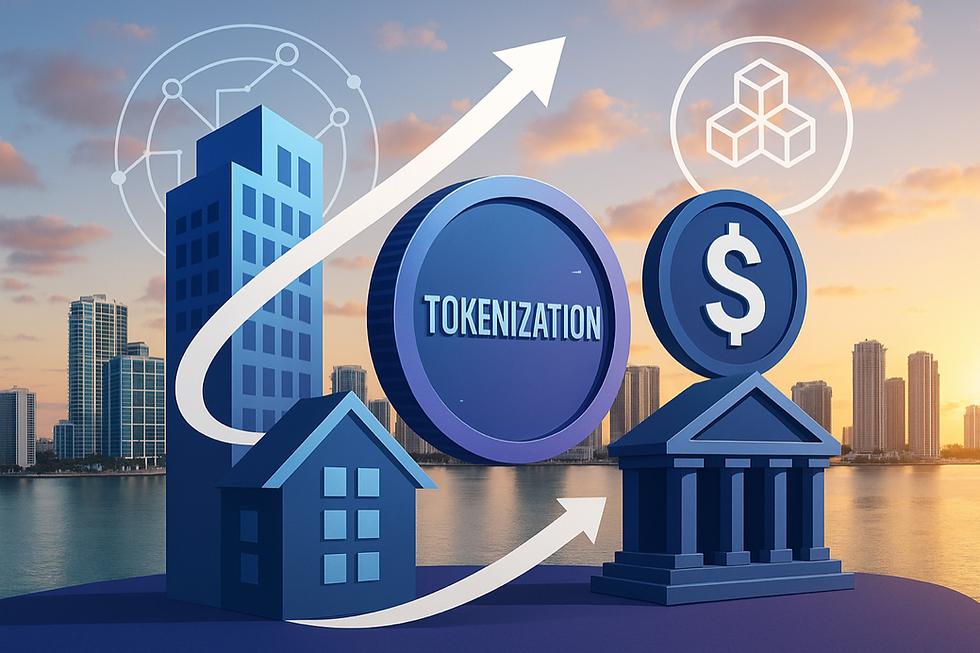- Sep 25, 2025
- 4 min read
Updated: Sep 29, 2025

The convergence of cryptocurrency and real estate investing is creating innovative new ways to build wealth—and equity funds are at the center of this evolution. For crypto holders and traditional investors alike, these funds represent a bridge between the high-growth world of digital assets and the stability of tangible property ownership.
By understanding how crypto equity funds work, investors can gain diversified exposure to tokenized real estate without taking on the complexity of direct property management—while staying fully engaged in the digital asset economy.
What Are Equity Funds in Crypto Real Estate?
In traditional finance, equity funds pool investor capital to purchase ownership stakes in companies or assets. Investors receive proportional shares in the fund and participate in profits from dividends, appreciation, or asset sales.
In the crypto real estate ecosystem, equity funds adapt this familiar structure to focus on tokenized properties and blockchain-based real estate platforms.
Real Estate Tokenization: Tokenization converts property ownership rights into digital tokens recorded on a blockchain. Each token represents fractional ownership, allowing investors to buy and sell real estate shares with far greater flexibility and lower capital requirements.
Crypto Equity Funds: These funds aggregate investor capital and acquire tokenized assets across multiple properties or projects. They may also invest in companies building tokenization infrastructure—providing exposure not only to real estate but also to the growth of the broader blockchain ecosystem.
This model enables investors to diversify their holdings while bypassing the traditional barriers of direct property ownership, such as high minimum investments, legal paperwork, and ongoing management headaches.
How Crypto Equity Funds Work
The process of investing through a crypto equity fund follows a structured path:
Capital Pooling
Investors contribute cryptocurrency or fiat currency to the fund. This pooled capital creates purchasing power large enough to access premium or institutional-grade real estate deals.
Asset Selection
Professional fund managers conduct rigorous due diligence to select promising tokenized real estate investments with strong fundamentals. This may include residential rental properties, commercial office buildings, mixed-use developments, or even private credit opportunities collateralized by real estate.
Token Acquisition
Once selected, the fund acquires digital tokens representing fractional ownership in the properties. These tokens are stored in secure, institutional grade blockchain wallets, often with multi-signature security or multi-party computation (MPC) technology.
Portfolio Management
Fund managers actively monitor property performance, rebalance holdings, and manage risk exposure. Returns—whether from rental income, property appreciation, or token resales—are distributed proportionally to investors, often in stablecoins or fiat currency.
Benefits of Tokenized Real Estate Funds
The appeal of crypto equity funds lies in the combination of blockchain’s efficiency and real estate’s stability. Key advantages include:
Lower Barriers to Entry: Tokenization allows investors to participate with relatively small amounts of capital, opening premium real estate opportunities to a broader pool of investors.
Improved Liquidity: Tokenized assets can be traded on secondary markets, offering faster exits compared to traditional real estate ownership, which can take months to sell.
Built-In Diversification: By pooling investor funds, equity funds spread exposure across multiple properties, reducing single-asset risk and enhancing portfolio stability.
Enhanced Transparency: Blockchain’s immutable public ledger ensures every transaction is recorded and auditable, reducing fraud and increasing investor confidence.
Global Market Access: Tokenization enables cross-border participation, letting investors gain exposure to international markets that might otherwise be inaccessible.
Quick Guide: 3 Questions to Ask Before Investing
What Is the Fund’s Strategy?
Is it focused on income-generating rental properties, value-add development projects, or a mix of both?
How Is Risk Managed?
Ask about loan-to-value ratios, custody solutions, and contingency plans for crypto price volatility.
Who Is Managing the Fund?
Look for teams with a strong track record in real estate underwriting and familiarity with blockchain infrastructure.
Key Risks and Challenges
Despite their potential, crypto equity funds are not risk-free. Investors should carefully consider:
Market Volatility: The value of both cryptocurrencies and tokenized assets can fluctuate significantly, which may affect fund performance and net asset value.
Regulatory Uncertainty: Tokenized real estate operates in an evolving regulatory landscape. Compliance requirements vary by jurisdiction and may change as governments establish clearer frameworks.
Cybersecurity Threats: Custody solutions must be robust, with strong encryption, cold storage, and regular audits to mitigate hacking risks.
Fund Manager Expertise: As with any managed fund, performance is tied to the skill and discipline of the management team. Poor asset selection or operational missteps can negatively impact returns.
The Future of Blockchain Real Estate Investing
Equity funds are poised to become a cornerstone of blockchain-enabled real estate investment. Industry leaders, including Deloitte, predict that real estate tokenization could transform global asset management, increasing efficiency and expanding access to property markets worldwide.
As adoption grows, well-managed crypto equity funds could emerge as a preferred vehicle for both institutional and retail investors to build diversified real estate portfolios—without the high capital requirements or administrative burden of direct ownership.
Looking ahead, integration with decentralized finance (DeFi) protocols may further enhance liquidity and create new ways for investors to borrow against their holdings, trade fractional shares, and participate in global property markets 24/7.
Take the Next Step
Interested in seeing how this works in practice? Explore Participant Capital’s Digital Currency Investment Platform to learn how you can leverage your crypto holdings to participate in professionally managed real estate funds—without selling your assets or triggering a taxable event.
References
Deloitte: Digital dividends – How tokenized real estate could revolutionize asset management
EY: Real estate tokenization – A new era for property investment and Luxembourg’s strategic role
Baker McKenzie: Tokenized Funds and the Future of Investment Management
HoneyBricks: The Ultimate Guide to Investing in Tokenized Real Estate
Primior: How Tokenization Is Democratizing Real Estate Investment
Disclaimer: This blog post is for informational purposes only and does not constitute an offer to sell or a solicitation of an offer to buy any securities. Investment opportunities referenced herein are intended solely for accredited investors and may be offered only through appropriate offering documents. Past performance is not indicative of future results. Investing involves risk, including the possible loss of principal. Participant Capital does not provide tax or legal advice; individuals should consult their own advisors to understand the potential tax consequences. Views expressed are those of the authors and do not necessarily reflect the official views of Participant Capital or its affiliates.


